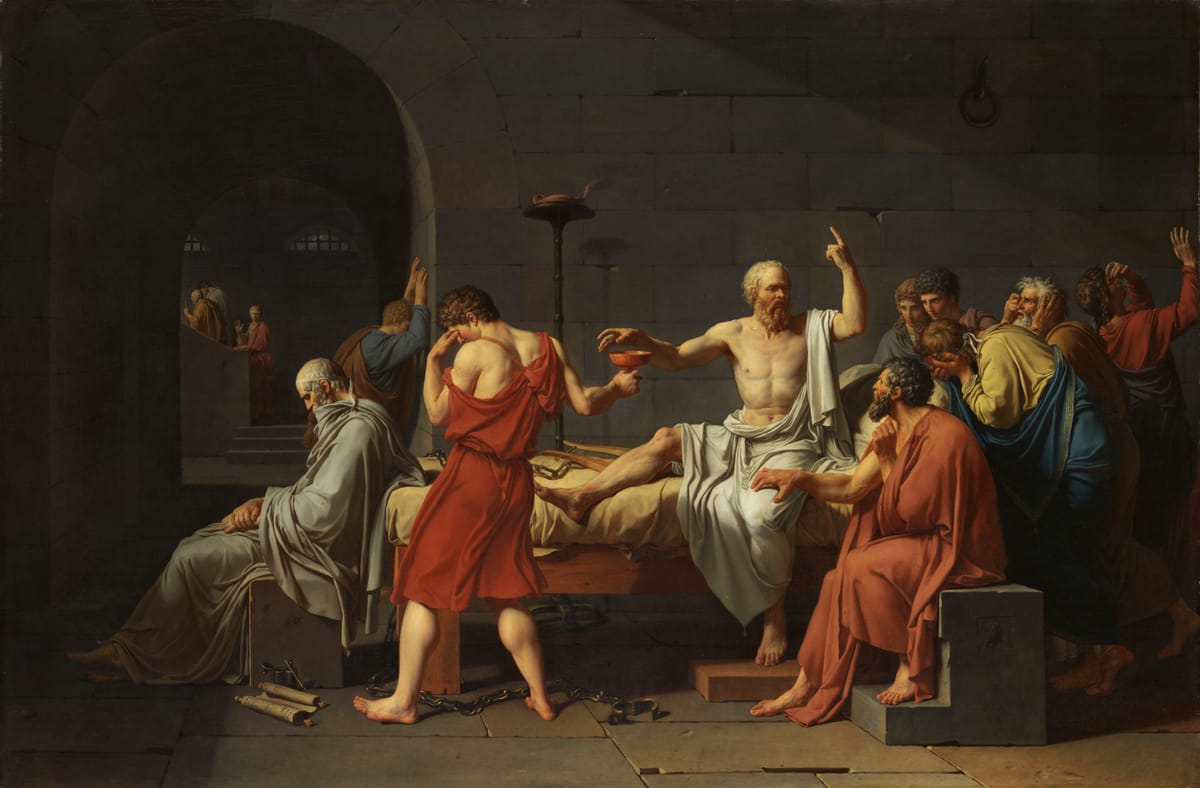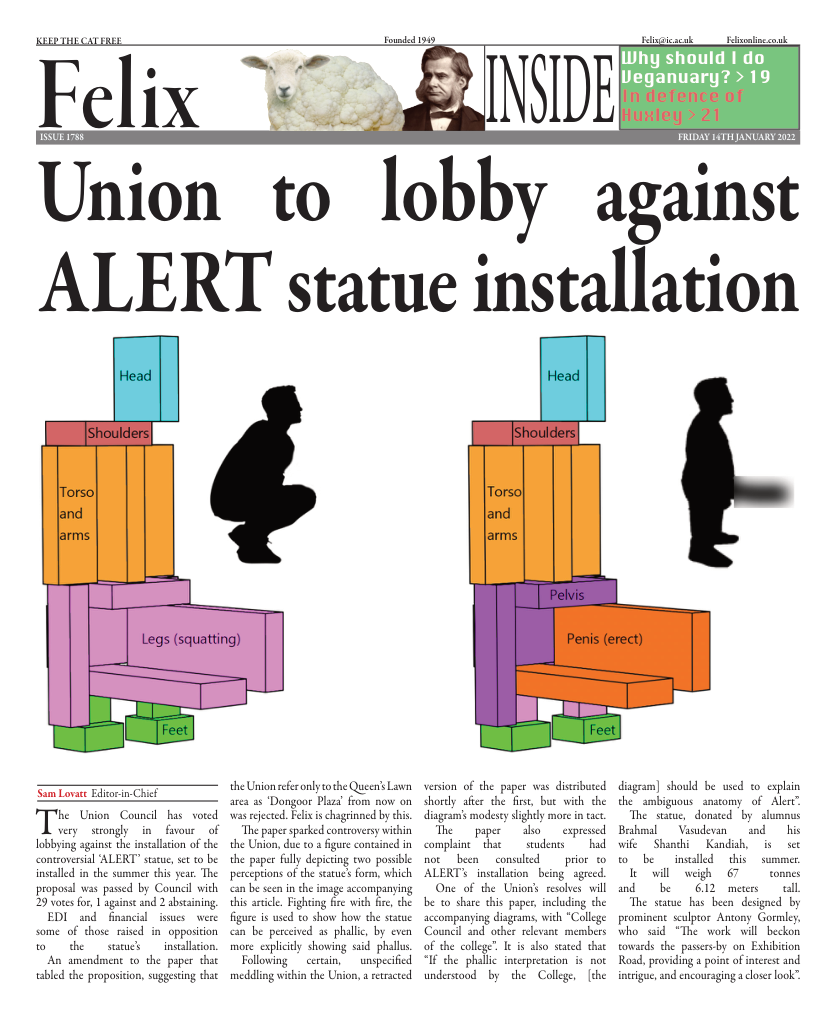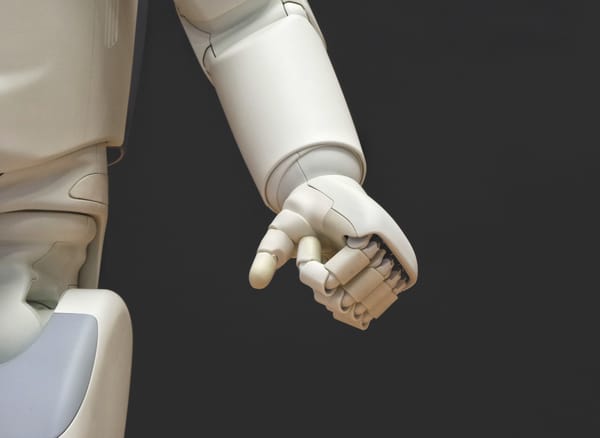Huxley’s apology
Comment writer Farid Kaveh questions Imperial's History Group on their recommendation of renaming the Huxley Building

“In the Cathedral of Christ the Saviour there use to be four agate columns. When the Cathedral was blown up in Stalin’s time, these were saved: first they were brought to the Donskoy monastery and then to the Moscow State University. While restoring the Cathedral the columns were searched for, but in vain. In the end a journalist decided to take photos of all columns in the University. One evening, while doing this, an office-cleaner told him that these four are in Rector’s office. And indeed they had been left - the University is the Temple of Science.”
Perhaps a better title for Thomas Huxley’s ‘Emancipation: Black & White’ would have been ‘Emancipation: Man & Woman’. Barring the opening few paragraphs, the essay concerns the inequality between men and women in education and their asymmetric roles in society. Huxley believed that, allowing even for the most common reasons male chauvinists gave for excluding the opposite sex from this or that arena, reasons which he himself held in low regard, women’s oppression was only injustice and their emancipation would bring only good to humanity.
Huxley wrote his essay shortly after the conclusion of the American Civil War had brought the institution of Southern slavery to an end across the Atlantic. He used the Black slaves’ emancipation as an anchor for his message of women’s liberation. As an abolitionist, he was heartened by the freedom the former slaves had attained. Yet, it is true that he espoused in this essay a racial hierarchy of intelligence, as alleged by the Imperial College’s Historical Group. He did not believe that “The average neg** is the equal, still less the superior, of the average white man ... it is simply incredible that ... he will be able to compete with his bigger-brained and smaller-jawed rival.” These sentiments were heavily motivated by the discipline of craniology. The predictions of craniology have since been discredited and it is no longer seriously practiced. Modern genetics sheds light on the question of race and intelligence which craniology tried and failed to tackle: there is no correlation between the genes that determine a person’s racial identifiers, such as skin colour, eye lid shape, etc., and the individual’s intelligence. That is to say, that racial equality in the sense of intelligence has been established as a matter of fact.
There has also been another related, but very different, development since Huxley wrote his essay. In his time, an integrated multi-racial society was completely outside the popular imagination, even among most classical progressives (among whom we count Huxley). Today, on on the other hand, multi-ethnic multi-culturalism is a core tenet of liberal progressivism. As part of this transition, the truth of racial equality has been enshrined in our culture. In this context, racial equality is understood to be self-evident, or in other words, it is understood as a matter of faith.
The role of values and faith in human society and culture is not well understood, and what has been said of it we could not hope to summarise here. Suffice it is to say that for one reason or another, faith often plays a role in our societies that fact could not. In view of this, to embrace equality as a core belief may even be necessary for the cohesion of a multi-ethnic society. But in a liberal democracy, such as ours, there are certain institutions whose role is not simply to manifest the values of that society at any given time, but to preserve and seek universal truths that supersede the values of any people anywhere and at any time. These are the liberal institutions, traditionally the universities and colleges.
Indeed, our culture and values are the manifestations of fleeting popular consciousness and our fickle collective memory, and faith and prejudice are two sides of the same coin. The self-evidence of racial equality is simply an expression of our egalitarian prejudice. Granted, when it comes to prejudice one could do worse than egalitarianism, but it is a prejudice nonetheless. There are parts of the world today, among the democratic, lawful places, where racial equality is not any more assumed than any other claim about the natural world. This is not because the people of these places are unenlightened, but because they do not share our egalitarian faith. Yet scientific racial equality is as true in one place as it is in another, and it is as true at one time as it is at another. But inevitably, challenging theories will arise at different places and at different times. In fact, they are budding all around us today.
We must be able to defend the truth against such challengers not merely with righteous proclamations, but with the evidence from which they can be impartially established, else we risk losing ground against false theories whose agents can, at a particular place and time, seem more righteous than ourselves. This, to protect natural, universal truths against unworthy challengers, is the primary task and duty of any body that dares to call itself a liberal institution. This Olympian responsibility cannot be fulfilled if the institution is to allow itself to be swayed by the prejudices that immediately surround it, or even those that occupy its halls. Although any particular prejudice may champion some conclusions that agree with our best theories of the world, it will be useless in defending those conclusions. That is to say, that to be prejudiced is to reason from conclusions, while the task of a liberal institution is to reason to conclusions.
Moreover, a people’s faith and prejudice are not constant but are in fact easily and quickly changed and even manipulated. Our faith is just as likely to change for the worse as it is to change for the better. In recent times we have found false comfort in the now-conventional wisdom that the arc of history bends towards justice. This false hope is another artefact of our biases today. In fact it may be said to be an example of historical survivorship bias. As even the most cursory survey of the arc of history will reveal, it bends whichever way it is forced. Hence, an institution that couples itself with the culture and faith of any people will inevitably find that it is unable to defend this faith against ideological aggressors (regardless of the veracity of the faith), and also that this faith on which it has rested its foundation is not constant, but ever-changing, with little regard for universal truths or facts. Such an institution would be more akin to a local gallery that curates its collection to cater to its audience’s idiosyncratic tastes than to a world leading university that seeks to preserve and advance knowledge of scientific truths. Such a body could be a successful cultural institution, but it could never be a liberal institution.
In the context of the removal of references to Thomas Huxley on the South Kensington campus of Imperial College, London, this has the following consequences: the college must decide whether it considers racial equality to be foremost a matter of fact, or a matter of faith and prejudice. Crucially, one cannot at the same instance consider racial equality both a matter of fact and a matter of faith, since these two starting points so often lead to irreconcilable ends. Considering the case of Huxley and taking view of his abolitionism and his activism in favour of the marginalised in his time, we can say with some conviction that his erroneous ideas about a racial hierarchy of intelligence were not motivated by malice or hatred, but were the genuine result of errors in his understanding of the world. So, if racial equality is a matter of fact, then Huxley deserves no blame for his misconceptions, since they arose not from malice but through false theories of the world, in particular, demonstrably false claims about race. Indeed, to blame Huxley for his views on race would be to condemn Newton for his formulation of absolute space and time. Since Newton’s theory also arose from faults in understanding, leading to demonstrably false predictions. Such renunciation of past scholars would have grave consequences for all academics at the college today. We all investigate the nature of this world, but all our theories of it, in spite of incremental improvements, are ultimately incomplete and mistaken. If this immutable nature of our work, that is, the incompleteness of our theories, is grounds for us to be ostracised, then we cannot safely inquire into the nature of this universe. Therefore, if the college understands racial equality to be a matter of fact, but still chooses to disown Huxley’s legacy by removing references to him on College grounds, then it must abandon any and all claims to being a liberal institution. In fact, by following this course of action, the college would not only be abandoning its own claims to liberalism, it would be rejecting liberalism altogether.
On the other hand, if the college understands racial equality to be first of all a matter of our egalitarian faith (on campus, in London, in the UK and broadly across the West), then indeed, it may distance itself from the Huxley name while avoiding an outright rejection of liberalism. Indeed, if racial equality is a matter of faith, then Huxley, as a heretic, deserves no less blame and condemnation than a heretic who might appear on campus today. However, in the process, by tying itself to the popular interpretation of racial equality as a matter of faith, the college will have understood and formulated itself as a cultural institution, so that in future it will no longer have the legitimacy to strive to seek and defend universal truths, and shall instead be confined to the curation of its collection to the tastes of prospective students.
Whether universities around the world formulate the principle of racial equality as a matter of fact or a matter of faith will prove to be a deciding factor for the future of our world. But as far as the future of Imperial College is concerned, the disavowing of Huxley’s legacy shall be the unequivocal end of the college as a liberal institution, regardless of this rather technical distinction. Since it will henceforth resemble a Sunday school far more than any liberal body, it may be best if the college no longer characterised itself as a ‘college’ or a ‘university’. Afterall, honesty is a cornerstone of any faith.









